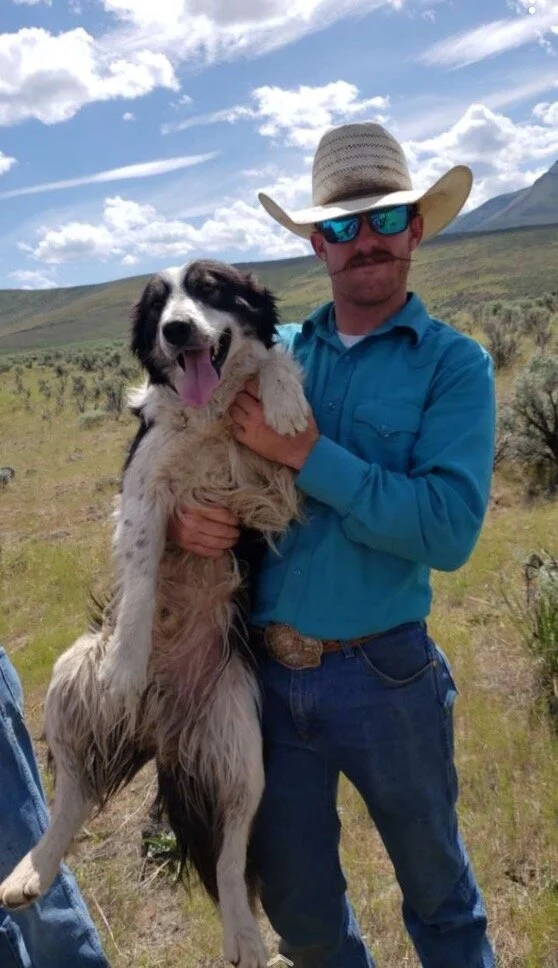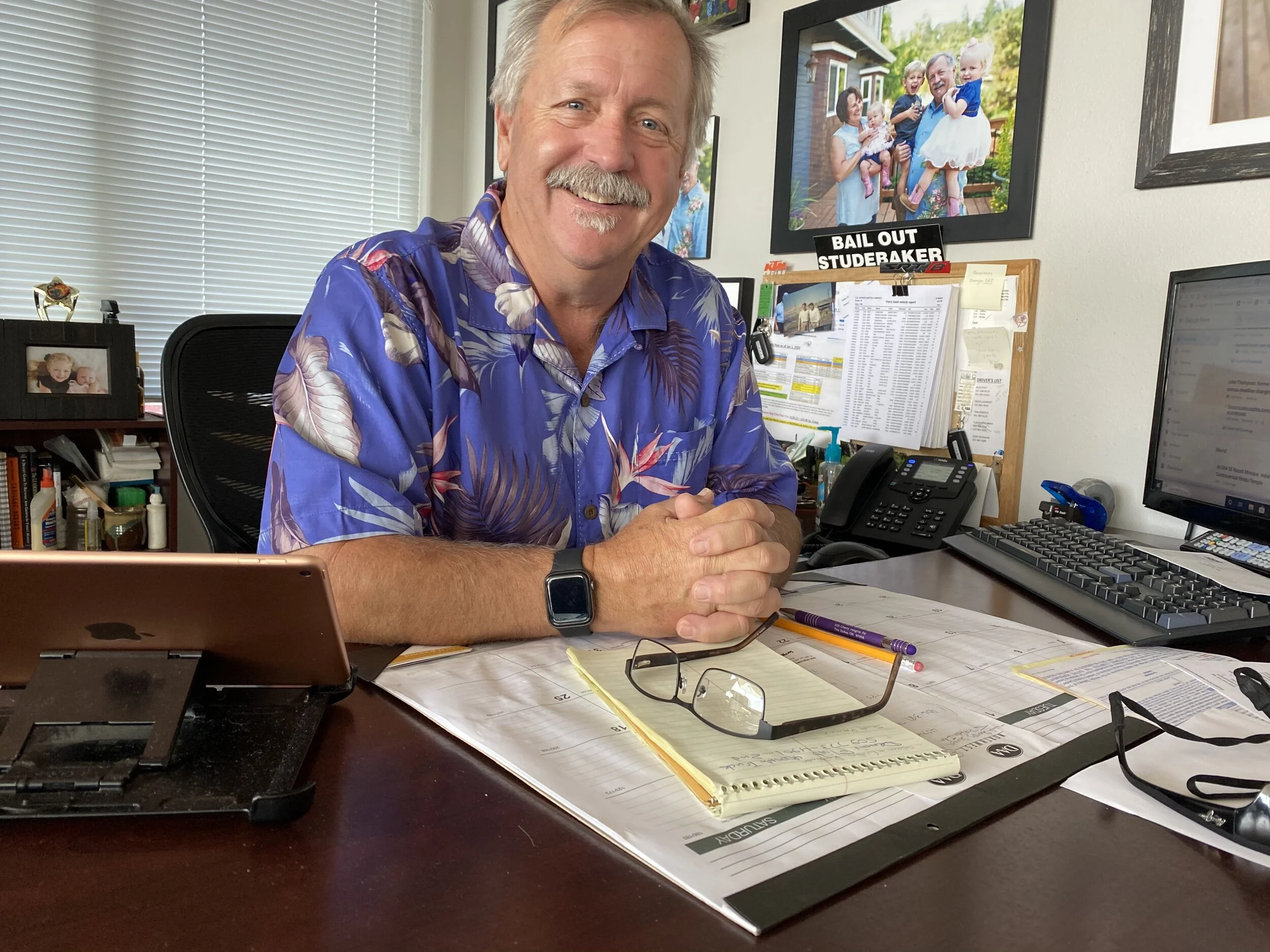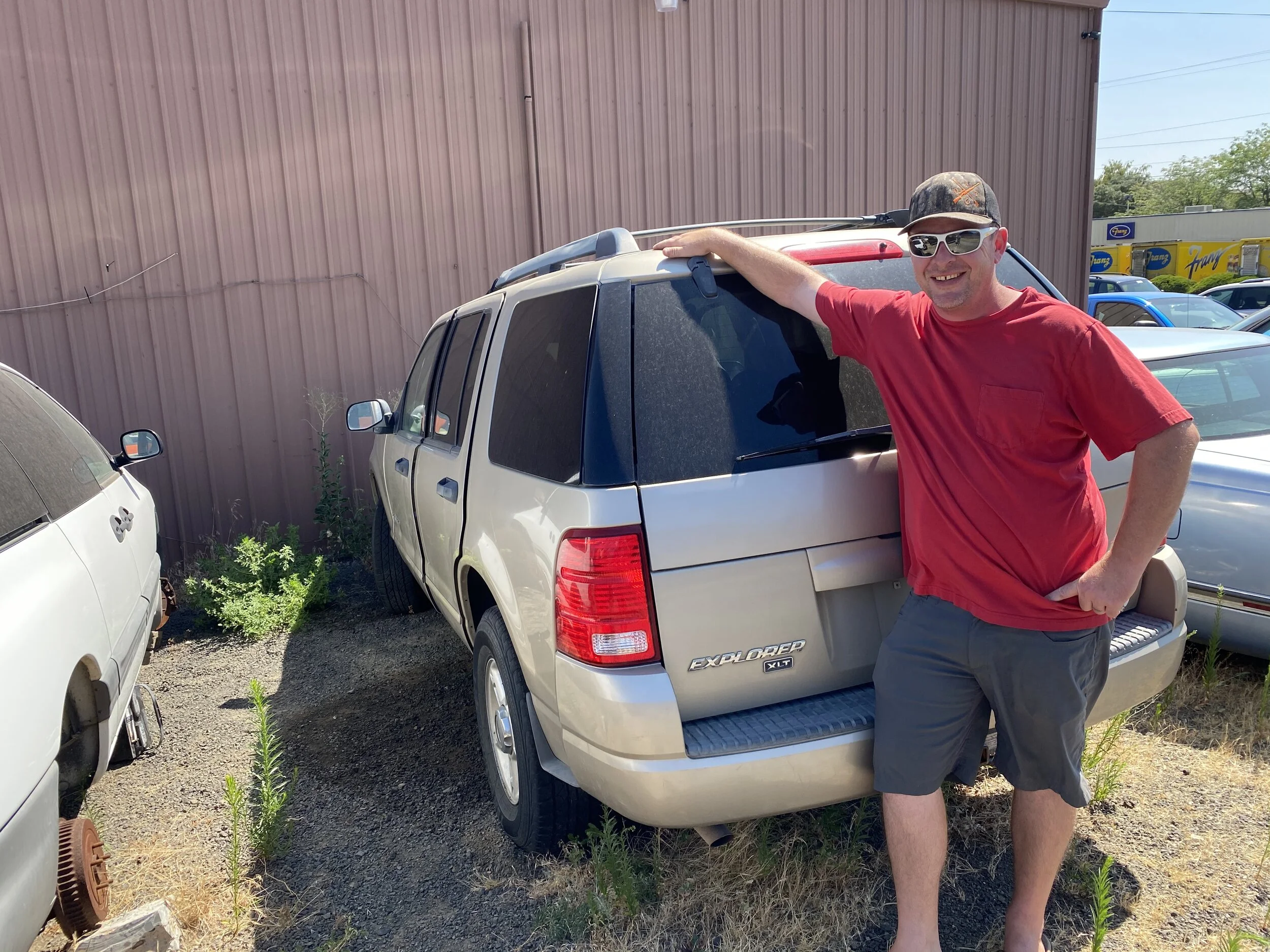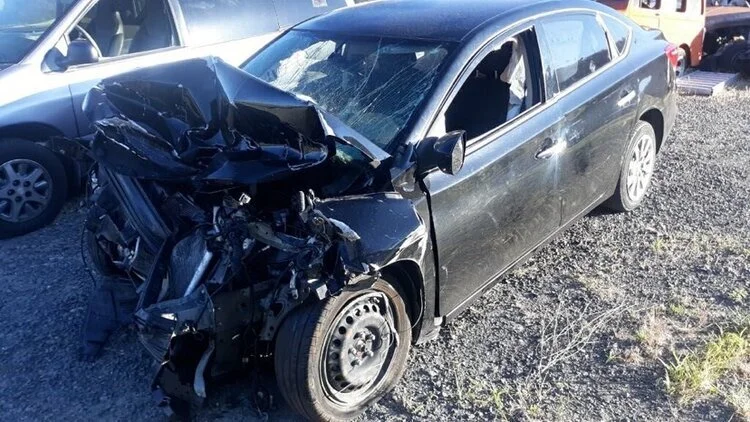Bull Tour 2021
New North Central President Jerod Warnock said the Bull Tour has morphed some since it started decades ago. “We move around to different ranches and see how ranchers are doing things and the new things they have implemented.” The Tour is set for April 16. Tickets are available.
By Tom Peterson
North Central Livestock Association President Jerod Warnock ranches near Madras and close to Bakeoven. His family has been on the ranch since the 1980s. Warnock and his Border Collies will work cattle this year at the Bull Tour.
The North Central Livestock Association is gearing up for its 2021 Bull Tour, which will focus on ranches in the Wamic and Tygh Valley area on Friday, April 16.
New North Central President Jerod Warnock said the traveling event has morphed some since it started decades ago. Warnock works outside of Maupin near Bakeoven on the family ranch, which he grew up on.
“We move around to different ranches and see how ranchers are doing things and the new things they have implemented,” the 31-year-old said. “Different sponsors are on-site detailing information such as food supplements or latest machinery.”
This year the Tour will be focused at the Wasco County Fairgrounds, with several demonstrations, including team branding and demonstrations of how to best use dogs in moving cattle.
“I think it is going to be a blast,” said Kyle Fields, who works on the Fields Ranch near Wasco. “People can learn something to help them ranch or farm, and it will be good to have everybody together. People are itching to see each other.” Fields was recently elected the North Central Livestock Association vice president.
Warnock agreed that the tour was kind of a display of unique and best uses of natural resources when it comes to ranching and farming. Moving cattle from pasture to pasture, eliminating juniper to improve the watershed. “There’s never a best one,” Warnock said, noting ranches and practices vary depending on geography and terrain. “There’s no one size that fits all.”
“That’s what makes it interesting, all the different approaches,” he said.
The tour will kick off at 9 a.m. at the Wasco County Fairgrounds in Tygh Valley and then move onto ranch tours before returning. Warnock said he and his Border Collies will working stock in the arena of the Fairgrounds. And all-new for 2021, is the action-packed Team Branding. Teams made up of four will brand from the ground as well as from their horses.
Fields, who raises feeder stock in registered Angus and SimAngus, on a ranch near Scappoose, said his work was his passion and the Tour was a great way to keep in touch with others in the same trade.
File photo of past Bull Tour - Credit Condon Chamber of Commerce and my personal favorite K’Lynn Lane.
“Getting to work with both farmers and ranchers, there is nothing else I would rather be doing. I care about the cattle industry and the people in the community running cattle. It’s a passion of mine.”
North Central’s Breanna Wimber said she was excited for this year’s tour.
“Once again you can expect a day jammed packed with tours, vendor engagement, amazing lunch and dinner, and various industry speakers,” she said. “We encourage people to bring a friend and invite new people. This annual event is always an amazing look inside the farms and ranches our beautiful region has to offer.”
Tickets are $45 pre-purchased or $50 day of the event. Or buy 10 tickets for $400.
For more information, call:
Amy McNamee at 541- 325-2121
Breanna Wimber 541-806-3209
Click here for their Facebook page.
Please Watch the Facebook for Additional Information and Ranch Branding Entry Info.
Plans for childcare facility underway in Goldendale
Work is underway in the Goldendale area to plan for a future childcare facility as well as to develop a path for individuals to become certified to provide in-home childcare. The Childcare Committee of Klickitat County recently contracted Larissa Leveque to create a more centralized point of information in regards to the childcare facility licensing process.
The following is a press release from Washington Gorge Action Programs:
Goldendale, WA (November 11, 2020) – Work is underway in the Goldendale area to plan for a future childcare facility as well as to develop a path for individuals to become certified to provide in-home childcare.
As part of a recent planning grant from the Washington State Department of Commerce, the Childcare Committee of Klickitat County recently contracted Larissa Leveque as the Childcare Liaison through its fiscal sponsor Washington Gorge Action Programs (WAGAP). Leveque is undertaking the role to create a more centralized point of information in regards to the childcare facility licensing process.
Larissa Leveque
This new journey is a personal one for her. Leveque has six years’ previous experience working in the childcare industry and is currently enrolled with Clark College, studying for her Associate’s Degree in Early Childhood Education. Her personal goal is to become certified to be a childcare center director.
She and her husband recently moved to the Goldendale area and as she looked for opportunities in the industry, she quickly became aware that none existed locally. She started inquiring about what is available and what would it take to start a center or provide in-home childcare. Her journey led her to Penny Andress, KVH Nurse Care Manager and a co-founder of the Committee. Andress said she was very excited about the timing of their meeting and that she is looking forward to the progress they expect to make as she said Leveque is, “so vested in bringing quality childcare to our community.”
“My job is to try to develop a business plan,” Leveque said, “for both the center we are hoping to develop, as well as for in-home providers.” She is working closely with the Washington Department of Children, Youth and Families (DCFY), the state agency that oversees licensing for childcare facilities. She is also becoming familiar with other programs such as the U.S. Department of Agriculture’s (USDA) Child and Adult Care Food Program (CACFP) that provides reimbursement for nutritious meals and snacks that meet minimum guidelines. She noted that programs such as CACFP can help offset costs, which are often part of the barrier of running a successful facility, especially in a rural community.
Training and certification requirements are other areas that she is studying in an attempt to help bring information together in one location to help those interested in getting licensed to provide in-home childcare. The plans she is developing will be intended to aid them as they navigate through the many hurdles to opening their businesses. The overall goal will be to increase local capacity to support families with young children and assist local employers with workforce stability.
Leveque noted this is the beginning of a new stage for the childcare committee as it prepares to embark on a formal feasibility study to uncover the needs, potential local assets and requirements to bring licensed childcare providers to the Goldendale area. She invites groups and individuals interested in the licensing project to reach out to her by email at rissaleveque@gmail.com or call her at (360) 936-6478.
Other interested individuals and organizations who would like to know more about the ongoing efforts of the Childcare Committee of Klickitat County should contact Leslie Naramore, WAGAP Executive Director at info@wagap.org or call her at (509) 493-2662 to learn more about how to contribute to the greater overall effort.
Washington Gorge Action Programs (WAGAP) is a 501(c)(3) non-profit Community Action Agency dedicated to helping individuals, families, and communities address basic human needs in Klickitat and Skamania Counties. For more than 50 years, the organization has offered support services to help people help themselves and reach self-sufficiency. Learn more at https://www.wagap.org/. For additional information email info@wagap.org or call (509) 493-2662.
Cutting out the Catalytic
Stealing catalytic converters from vehicles is not a new crime, but it is emerging anew in our region. Recent thefts in The Dalles and one at Deschutes State Park have vehicle owners coughing as repairs cost thousands, and crooks get pennies on the dollar.
By Tom Peterson
A recent hiker at Deschutes State Park found out how valuable his exhaust system was - the hard way.
After a three-day campout up river, he returned to his Acura MDX parked in the gravel parking lot near the entrance to the park on July 21.
But the car would not run. On further inspection, he found a crook had cut out his catalytic converter. The car had to be towed.
Catalytic converter for an Acura MDX, similar to the one that was recently cut out of a vehicle at Deschutes State Park. Cost for a new one: $1,200.
It’s an old game, according to The Dalles Police Chief Pat Ashmore, noting thieves have been cutting the converters out and selling them for scrap for years.
They can fetch from $50 to several hundred dollars a piece at scrap yards depending on the quality. They contain precious metals such as platinum, palladium and rhodium to help convert toxic gases and pollutants from the engine to less-toxic pollutants.
“It’s the first one we have had out here,” said Sherman County Undersheriff James Burgett. “I’d have to think cutting it out would have caused a lot of noise.”
The Acura was near the train tracks, and the thief could have used the noise of a train to blot out the noise from his cutting tool.
It is speculated that thieves are using reciprocating saws to cut the converters out of the exhaust line. Saw blades have been found at multiple crime scenes.
Burgett said it is fairly simple to find recyclers looking to purchase them, as he found one such business on Facebook.
“It’s like when we used to have copper thefts, and thieves would do $20,000 of damage to a new home to get $200 worth of copper,” he said.
Tim Urness of C.H. Urness Motors said the theft of catalytic converters out of newer vehicles cost the dealership more than $10,000 in damages at the start of the year. Thieves used a reciprocating saw to cut the parts out that can then be sold for scrap at $50 to $150 a piece. Meanwhile replacement costs run more than $4,000. No one has yet been pinned for the crime.
Tim Urness of C.H. Urness Motors in The Dalles has the receipts to prove that point. Derelicts cut out catalytic converters on two Urness’ vehicles in January - a 2019 Chevrolet Silverado and a 2017 Ford F250. They were parked facing the railroad track in the parking lot across from The Dalles Chamber of Commerce.
Reciprocating saw - thieves likely used a tool similar to this to cut catalytic converters out of vehicles in our region.
Thieves likely got $300 for the converters. Total repair costs: $8,577.
“They’re ballsy, absolutely ballsy,” Urness said. “I would have paid them the $300 not to cut them off,” he said from his office on Wednesday.
Witnesses said they saw the culprit cut out the converters from the Urness vehicles when the train was passing by to block out the noise. But no positive identification was made.
Once Urness discovered the theft, he said he had the remaining vehicles on the lot turned around to face second street so that police would be able to easily see anything unusual.
Two weeks later, Urness said somebody cut a hole in their fence near the Super 8 Motel to access catalytic converters that had been removed from vehicles. The company planned on returning them for $450 a piece. Thieves took all five, he said.
“It’s very, very frustrating.”
The crime is a class C felony theft in the first degree. It carries a maximum of five years in state prison and a fine not to exceed $125,000. However, the property crime falls fairly low on the priority chart, when compared with crimes against people. Criminals charged with the crime are oftentimes left to return to court upon their own recognizance when charged with the crime. What some call a “catch and release.”
Urness said the situation was both frustrating for him and police. “Their needs to be consequences or responsibility.”
Tommy Brace with The Dalles Auto Sales stands next to a Ford Explorer that had its catalytic converter sawed off. The cost of the damage was enough to make the vehicle unsellable, he said.
On west Sixth Street, Tommy Brace recently reported the theft of a catalytic converter. He and Yvonne Walton both said it was a common occurrence out back of The Dalles Auto Sale’s shop.
Thieves recently cut out the driveline in a Ford Explorer to get at the converter.
“They’re ballsy,” Brace said. Yvonne noted they have caught others sleeping in their “scrap” vehicles and leaving behind drug paraphernalia.
While businesses, such as The Dalles Auto Store, use cameras to catch people red-handed, that does not always work when thieves are working under the cover of darkness.
Walton said even their car carrier trailer had its catalytic converter stolen while it was parked on Pamona Street.
Adam’s Auto on west Sixth Street had three catalytic converters cut out of vehicles earlier this spring. Owners Adam and Rachel Knopf owned all three. So the theft came right out of their pockets.
Another similar theft in the same area occurred within the last two weeks.
And it ends up costing everybody more through higher prices, said Tim Urness. What’s worse, “It makes you feel violated,” he said.
Cuttin' Canola
Canola provides nice rotation for David Brewer east of The Dalles. Brewer, who farms southeast of The Dalles on Emerson Loop and Roberts Market Road, said his experimentation with canola, while not easy, has had its moments of success. And this year is no exception with yields on his canola at 54 bushels per acre, his best showing yet, he said last Tuesday with just two days left of cutting.
Ron Webber, David Brewer and Roy Buenrostro line out the day. Brewer would continue cutting canola while Webber worked on machinery repairs and Buenrostro was looking forward to a parts run for the bankout wagon.
By Tom Peterson
Nothing is usual.
Ron Webber is driving. He’s a 2014 Fort Dalles Bull Riding Champ. He’s got three daughters and a fourth on the way, Georgia. He’s taking me to the combine operating on a ridge east of The Dalles.
The truck driver is off today. Charles Young, an Alaska Airlines pilot, had to maintenance his camp trailer. The New Yorker, a shirt-tale relative, is helping shuttle grain on this farm in lieu of flying the friendly skies.
And David Brewer is cutting.
But it’s not soft white wheat, like most farmers in Wasco County.
He’s cuttin’ canola.
Crawling through the heavy stocks, the sickle bar slices and the header augers in the pods filled with tiny black seeds. Trash flies out the back end of the green John Deere. And the black seeds peter into the hopper behind the cab. He’s moving at 1- to 1.4- mph - a far cry from the 5 plus mph when cutting wheat. It’s a game of patience.
Any faster and you chance plugging the machine with straw and seeds thrash to the ground, not the hopper.
From the air-conditioned confines of the cab, Brewer called some recent yields “surprising.”
After planting canola in 2014, he planted a crop of spring wheat in the same field, and then let the soil a rest. His next crop of winter wheat on the same land hit 95 bushels an acre.
He had been trying to break 80.
Brewer, who farms southeast of The Dalles on Emerson Loop and Roberts Market Road, said his experimentation with canola, while not easy, has had its moments of success.
And this year is no exception with yields on his canola at 54 bushels per acre, his best showing yet, he said last Tuesday with just two days left of cutting.
He swung the combine around to the parked truck and augered the canola into the bed. They use a semi-truck to haul the seed to Warden, Wash., where it is processed by Viterra, the largest canola oil producer this side of the Rocky Mountains. They generally put out 39 million gallons a year.
Canola seed is bought in units of 100 pounds, which were fetching around $18. It can pay a bit better than soft white wheat, depending on production costs.
With a high smoke point, the oil is versatile and light - good for frying, sauteing, baking, marinades, and even salads.
And it packs a punch - 124 calories per tablespoon. A 40 oz. jug at $3.50 will get you close to 10,000 calories. Take that McDonalds.
Brewer said the crop also had several other merits such as providing food and cover for wildlife. He stirred up 10 bucks recently who were using the crop to shield the sun. Chucker, pheasant and coyotes are also apt to lie under its canopy.
The raw seed, which is the size of a ballpoint , has a light flavor and after chewing several a hint of cauliflower emerges.
Brewer grows a non-GMO variety called Mercedes. The rotation helps him change up his herbicide applications, noting he could omit Roundup in fields of canola. Diversifying herbicide applications is a good practice to prevent weeds from eventually becoming immune to them.
On the other hand, Brewer said canola is a bit more finicky, requiring two applications of fertilizer as well as herbicide before it can be cut. And cutting it takes a special header and patience. That additional cost for fuel and wear and tear on machinery eats into the profitability.
But, he pointed out, the rotation has the ability to bring bigger crops of wheat and reduce cheat grass, a nice side effect.
Canola also saved some of his buildings.
When wild fires raged through his area in 2018, he said the fire backed by heavy winds just trickled through cut canola stocks which were still green. It gave Brewer and his family time to react and protect their property.
So, David Brewer, what are you going to do when the canola is cut?
Eight hundred acres of soft white wheat, he said.
Ron Webber takes a sample of canola from the back of the truck on Tuesday.
A full canola pod is seen at right with the threshed out black seed from a broken pod to the left.
Hit & Run vehicle "chock full of beer cans"
Vehicle hits semi before crashing into median on I-84 , milepost 119. Car was “chock full of beer cans.”
2014 Nissan Sentra after hitting a semi and median while eastbound on I-18 on Thursday morning.
Narrative from Oregon State Police Trooper Mark Amos:
“On Thursday June 25th at approximately 12:30 AM multiple driving complaints were reported of a black Nissan Altima eastbound on Interstate 84 near milepost 115 (about 11 miles east of Rufus). The vehicle was reported to have been swerving, speeding, and at one point struck the center median and continued driving. It later struck a semi-truck which disabled the semi-truck. The Nissan then crashed into the center median disabling it. Witnesses following the vehicle stopped at the scene of the crash and observed the occupants switch positions in the vehicle. Both appeared heavily intoxicated. OSP Troopers arrived and probable cause was developed to arrest one of the females for DUII, reckless driving, Assault III, and failure to perform duties of a driver (property damage.) Both occupants were injured with possible broken bones and abrasions. The driver refused field sobriety tests (HGN test while seated). She was observed speaking English to medics but claimed she only spoke Spanish when I arrived. She additionally provided a false date of birth and refused to present identification. Both occupants were transported to Good Shepherd Hospital in Hermiston. A search warrant was granted and executed. The driver was cited and released at the hospital. The vehicle was towed by Arlington Towing as it was disabled in the fast lane.
No names were provided in the report. Paul Jayo, owner of Arlington Towing said when he arrived he saw that the Nissan Sentra had come to a stop against the median in the center of the freeway. Officers had to break the window, to get the door open, to remove the passengers.
“It was chock full of beer cans,” Jayo said of the vehicle, noting 15 to 20 littered the floor - some empty, some full. Jayo, who spent 16- hours on removing an RV trailer and pickup from the highway after a tire blew out in the same stretch of highway several days ago, said people drive too fast. “They fall asleep, they do everything but drive. The road is too straight and next to the river. It mesmerizes you.”
Sherman County to get 200 megawatt windfarm
Avangrid Renewables today announced an agreement that will create a 200 megawatt wind farm, enough energy to power over 60,000 homes on an annual basis. The wind farm will be built by Avangrid in Sherman County, Oregon.
Image courtesy of Sherman County.
From Avagrid Renewables press release:
Puget Sound Energy and Avangrid Renewables Announce Power Purchase Agreement; Construction of New Wind Farm
Avangrid Renewables to supply PPA from new 200 MW wind farm in Sherman County, Oregon.
Bellevue, Wash. — August 18, 2020 — Puget Sound Energy (PSE) and Avangrid Renewables, a subsidiary of AVANGRID, Inc. (NYSE: AGR), today announced an agreement that will be supplied by a new 200 megawatt wind farm, enough energy to power over 60,000 homes on an annual basis. The wind farm will be built by Avangrid Renewables in Sherman County, Oregon. The Golden Hills Wind Farm will be Avangrid Renewables’ 13th in the Pacific Northwest and an important step toward realizing the company’s nearly 19 gigawatt project pipeline. The project will help PSE meet its goals to reduce carbon dioxide emissions while providing additional capacity to serve customers, particularly during winter periods of high electricity demand.
This agreement is part of PSE’s commitment to the environment and deep decarbonization by investing in more wind energy. PSE selected this project as part of the mix to meet the needs identified in its 2018 all source RFP. The addition of the Golden Hills wind project will increase PSE’s owned and contracted wind fleet to over 1,150 megawatts. These wind facilities form a key component in PSE’s clean energy strategy and progress towards Washington State’s clean energy goals.
“We are pleased to partner with Avangrid Renewables to continue to build on our history of championing renewable energy in the Pacific Northwest,” said David Mills, PSE Senior Vice President and Chief Strategy Officer. “This new wind project will enable us to continue to provide clean, reliable electric service to all of our customers.”
“The Golden Hills Wind Farm builds upon our strong track record of successful renewable energy projects in the Pacific Northwest,” said Alejandro de Hoz, President and CEO of Avangrid Renewables. “We are proud to continue to lead the region’s clean energy transition and provide long-term economic opportunities in rural communities.”
The Golden Hills Wind Farm will be located near the town of Wasco, Ore. Avangrid Renewables expects to complete the project by late 2021. The turbines will be spread across approximately 28,000 acres of grazing and dry-land wheat farmland held by 37 landowners.
The project is expected to deliver substantial economic benefits to the region both during construction and on an ongoing basis once operational. An estimated 250 jobs will be created or supported during the construction phase, and the facility will employ approximately 12 full time employees once it becomes operational. Golden Hills is expected to deliver over $220 million in landowner payments and local taxes over the lifetime of the project, providing a valuable source of revenue to local economies.
###
About Puget Sound Energy: Puget Sound Energy is proud to serve our neighbors and communities in 10 Washington counties. We’re the state’s largest utility, supporting 1.1 million electric customers and nearly 900,000 natural gas customers. For more about us and what we do, visit pse.com. Also follow us on Facebook and Twitter.
About Avangrid Renewables: Avangrid Renewables, LLC is a subsidiary of AVANGRID, Inc. and part of the IBERDROLA Group. It is a leading renewable energy company in the United States, owning and operating a portfolio of renewable energy generation facilities primarily using wind power. IBERDROLA, S.A., is an energy pioneer with the largest renewable asset base of any company in the world. Avangrid Renewables is headquartered in Portland, Oregon. For more information, visit www.avangridrenewables.com.
About AVANGRID: AVANGRID, Inc. (NYSE: AGR) is a leading, sustainable energy company with approximately $35 billion in assets and operations in 24 U.S. states. With headquarters in Orange, Connecticut,
AVANGRID has two primary lines of business: Avangrid Networks and Avangrid Renewables.
Avangrid Networks owns eight electric and natural gas utilities, serving more than 3.3 million
customers in New York and New England. Avangrid Renewables owns and operates a portfolio of
renewable energy generation facilities across the United States. AVANGRID employs
approximately 6,600 people. AVANGRID supports the U.N.’s Sustainable Development Goals and
was named among the World’s Most Ethical Companies in 2019 and 2020 by the Ethisphere Institute. For more information, visit www.avangrid.com.
Dufur School Flips The Switch
Statewide, all on-track seniors to graduate
Dufur School Teacher Ty Wenzel has some real go-getters.
The economics and math teacher said she has several seniors that have either completed or are close to getting their work complete in her online Economics class.
“Some finished in a week,” she said on Thursday afternoon.
All ON-TRACK SENIORS WILL GRADUATE
Oregon Gov. Kate Brown announced earlier this week that high school seniors will graduate if they were on track to pass their classes before the statewide school closure. All students who were on track will receive a passing grade and, under Brown's order, cannot be penalized by public Oregon universities for changes to their education during the closure.
Students who were not on track to graduate will be subject to local guidelines, according the Corvallis Gazette-Times. Local districts are to work with those students to find "creative ways" to allow them a path to graduation. Those measures can be taken up through Aug. 31. Students who complete those local requirements by that time will still be considered a part of the class of 2020, the story said.
FAST AND FURIOUS
“It’s been fast and furious over the last couple of weeks to get things going in the right direction,” said Dufur Superintendent Jack Henderson. “Teachers have done a nice job of pulling the best product together and putting it forward in this unique situation.”
Dufur had a rolling start and staff his been amazing at pulling off reading lessons via YouTube, for example, he said. Students are being served far ahead of the April 13th launch date.
GETTING ONLINE
“This was a big week of getting online and getting kids going,” Wenzel said, noting she has been helping students figure out passwords as well as Algebra.
Wenzel said explaining how to solve math problems is not simple online. She often will work a problem out on paper, take a photo of it and send it to the student who is struggling to derive the answer.
She has also been using a mix of tech tools to connect with and teach students during the past week. She is using Zoom video conferencing, emails and Khan Academy – an online resource with study materials, videos, quizzes and tests – to teach her students.
Students also were able to check out computers from the school if they needed them. And bus drivers have been handing out paper homework packets to students as they drop off lunches.
During a Zoom meeting this week, “most of her students showed up,” Wenzel said, noting others were either working or babysitting. She is connecting with absent students in separate one-on-one online communications. In addition, she also continues to instruct students on college credit class, Algebra 2.
“You miss the kids and being there and doing what you like to do,” she said. “It does not feel like teaching. You ask them to go watch videos and do these assignments.”
The Dufur first-grade teachers Marcy Bales and Sue Kelly used a Zoom video conference to do a show-and-tell.
“What a great idea,” Wenzel said.






















